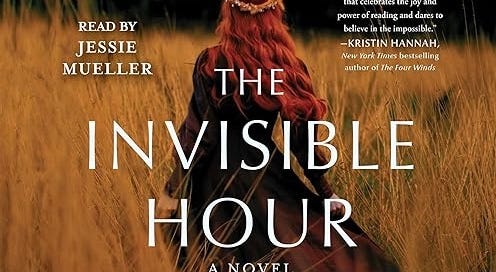BookLife Review by Carol O’Day: The Invisible Hour, (Alice Hoffman, author)
Magical realism, historical fiction, cult, Western Massachusetts, Boston, New England, late 19th century, Nathaniel Hawthorne, The Scarlet Letter, women's rights, book lovers, librarians
Alice Hoffman is a master storyteller and she doesn’t disappoint with her latest novel, The Invisible Hour. Ivy is a book-loving Boston teen whose parents receive the news of her pregnancy with harsh recriminations, and plan to send her away and place her unborn child up for adoption. Ivy runs. With almost no resources, she travels to Western Massachusetts to a cultish community outside of the town of Blackwell in the Berkshires. There she catches the eye of the Community’s charismatic leader, Joel Davis. Davis marries her, essentially trapping her and her child on the Community’s farm and under his control. Books and reading are forbidden in the Community.
Flash forward. Ivy’s baby, Mia, has become a teen, and Mia chafes at the restrictions and rules that govern life in the Community. Despite rules that render all children as “belonging” to all members of the community, Ivy finds opportunities to bond with Mia privately. Among the gifts (or curses) she shares with her daughter is her love of stories. On one Community marketing day in the town, Ivy sends Mia into the local library under the guise of Mia’s need of the restroom there. There Mia discovers books. She pockets a first edition of Nathaniel Hawthorne’s The Scarlet Letter and hides it in the Community’s barn. She is enthralled with the book, and it is one of a handful of items she keeps as her own.
A tragic accident separates Mia from Ivy and Mia flees the farm, contemplating suicide. However, she reads The Scarlet Letter by the riverside and feels deeply and immediately connected to Hawthorne. She decides to survive. Davis is enraged by Mia’s escape. He hunts her to Concord, Massachusetts where she has found safe haven in the home of the partner of the Blackwell town librarian. The two women give Ivy shelter and protect her from Davis. In Concord, Mia becomes a student of all things Hawthorne, and a frequent visitor to the nearby museum in his name.
The Invisible Hour takes a magical leap into time travel. Pursued by Davis who threatens Mia and her caretakers, Mia runs away. She falls asleep and awakens in the mid-1800s, alive and sentient in another century in the woods near Hawthorne’s home. She holds her copy of The Scarlet Letter at a point in history before Hawthorne even conceived of the book. Of course, the two meet, and they fall in love.
As a devotee of Hawthorne’s work, Mia is terrified by the prospect of doing anything that could alter history, interfere with the facts of Hawthorne’s life as they are meant to unfold, or change even a word of what Hawthorne will write. After a passionate affair, she travels back to the future. But, she and Hawthorne are both heart-broken. Meanwhile, Davis’s Community has fallen on hard times, others have left the cult and Davis’s ownership of the farm is challenged. He stalks Mia, certain that she is in possession of a document that proves his ownership of the farm.
Time toggles back and forth in this novel. Accepting this magical premise is a worthy journey. Mia and Ivy’s story parallels the story of Hester Pryne of The Scarlet Letter; Mia identifies with the story of the outcast pregnant woman in which mirrors her own mother’s experience in modern times. When Mia is back in Hawthorne’s time, she has many conversations with Hawthorne’s beloved sister, Elizabeth. Elizabeth is a bright and talented woman trapped by the mores and restrictions of the times in which she lives. She yearns for a time and place where she can exercise her talents and govern her own destiny. She interrogates Mia about whether the future from which Mia hails offers women more choice. Mia replies that it does, and it doesn’t. While modern women may attend college, vote, own property and make independent career and marriage choices, not all is perfected in the equality of the sexes, even in modern day New England. The prospect of a future with greater opportunities for women is a double-edged sword for Elizabeth, and she resolves to devote herself to her brother’s genius and success. Mia orchestrates a fitting conclusion to Davis’s misdeeds and a magical ending of her own.
Please support BookLife: Reviews for Readers and independent booksellers by purchasing The Invisible Hour using the Bookshop.org link below:





